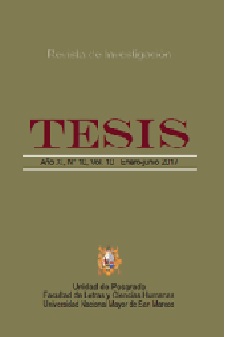La doctrina de la libertad en el pensamiento ácrata: de Manuel González Prada y Manuel y Delfín Lévano a Avram Noam Chomsky
DOI:
https://doi.org/10.15381/tesis.v10i10.18692Keywords:
Acracy, Anarchy, Democracy, Ethics, Philosophy, FreedomAbstract
Analyses, under the analytical methodology-hermeneutic, the contributions of Manuel González Prada and Manuel and Delfin Lévano, exponents of the Peruvian libertarian thought of the beginnings of the twentieth century and confronts them with those of Noam Chomsky. He proposes that the anarchist discourse is legitimized as a radical critique of the prevailing political systems in the West (monarchy, dictatorship, Democratic Republic) since the mid-nineteenth century, after the shortcomings of these systems of government were found to Solve economic and social problems. The discourse anarchist emerges as the confluence of liberalism and socialism, and as a corpus theoretical is in force and can be considered as a philosophy or worldview with ontological implications, axiological, ethics, Gnoseológicas.
Downloads
Published
Issue
Section
License
Copyright (c) 2017 Leonel Patricio Silva Montellanos

This work is licensed under a Creative Commons Attribution 4.0 International License.
THE AUTHORS RETAIN THEIR RIGHTS:
(a) The authors retain their trademark and patent rights, and also on any process or procedure described in the article.
(b) The authors retain the right to share, copy, distribute, execute and publicly communicate the article published in Tesis (Lima) (in example, depositing the article in an institutional repository or publish it in a book), with recognition of its initial publication in the Tesis (Lima).
(c) The authors retain the right to make a later publication of their work, to use the article or any part of it (for example: a compilation of their works, notes for conferences, thesis, or for a book), provided that they indicate the source of publication (authors of the work, magazine, volume, number and date).














